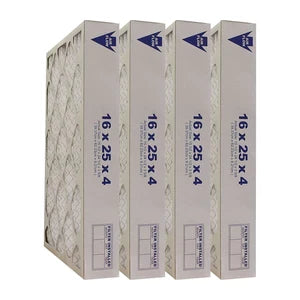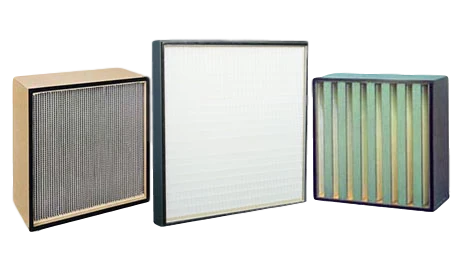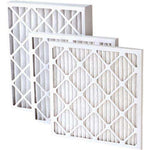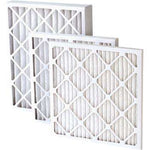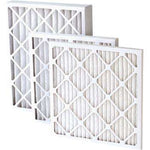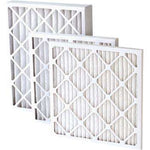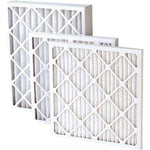You have no items in your shopping cart.
In the complex world of air filtration, rigid cell box filters stand out as a highly effective and versatile solution for various applications. Whether it's in industrial settings, commercial buildings, or healthcare facilities, these filters play a crucial role in maintaining air quality, enhancing HVAC system efficiency, and ensuring a healthier environment. In this blog, we will explore what rigid cell box filters are, their benefits, and why they are a preferred choice in many scenarios.
What Are Rigid Cell Box Filters?
Rigid cell box filters, also known as rigid box filters, are high-efficiency particulate air (HEPA) filters designed to remove airborne particles from the air. They are constructed with a robust, rigid frame that holds the filter media in place, ensuring consistent performance and durability. The filter media is typically made from fiberglass or synthetic materials, which are pleated to increase the surface area and capture more particles.
These filters are known for their high dust-holding capacity, low resistance to airflow, and long service life. They are commonly used in environments where high air quality is essential, such as cleanrooms, hospitals, laboratories, and commercial HVAC systems.
Key Features of Rigid Cell Box Filters
-
High Efficiency: Rigid cell box filters are designed to capture a wide range of airborne particles, including dust, pollen, mold spores, and bacteria. They are available in various efficiency ratings, including MERV (Minimum Efficiency Reporting Value) ratings, which help users select the appropriate filter for their specific needs.
-
Durability: The rigid frame of these filters ensures they maintain their shape and performance over time, even in demanding conditions. This durability reduces the frequency of filter replacements, leading to cost savings and less maintenance.
-
Low Airflow Resistance: These filters are engineered to provide low resistance to airflow, which helps maintain the efficiency of HVAC systems. This feature is crucial for reducing energy consumption and ensuring optimal system performance.
-
High Dust-Holding Capacity: The pleated design of the filter media increases the surface area, allowing the filter to capture and hold more dust and particles. This capability extends the filter's lifespan and reduces the need for frequent replacements.
-
Versatility: Rigid cell box filters come in various sizes and configurations, making them suitable for a wide range of applications. They can be used in both standard and custom HVAC systems.
Applications of Rigid Cell Box Filters
Rigid cell box filters are used in numerous applications where air quality is a priority. Some common applications include:
-
Commercial Buildings: In office buildings, shopping malls, and other commercial spaces, maintaining good indoor air quality is essential for the health and comfort of occupants. Rigid cell box filters help remove pollutants and allergens, ensuring a healthier indoor environment.
-
Healthcare Facilities: Hospitals, clinics, and laboratories require stringent air filtration to prevent the spread of infections and maintain sterile environments. Rigid cell box filters are crucial in these settings, providing high-efficiency filtration to protect patients and staff.
-
Industrial Settings: In manufacturing plants and industrial facilities, air quality can be compromised by dust, fumes, and other airborne contaminants. Rigid cell box filters help improve air quality, protecting equipment and ensuring a safer working environment.
-
Cleanrooms: Cleanrooms used in pharmaceutical, biotechnology, and electronics industries require ultra-clean air to prevent contamination of products. Rigid cell box filters provide the necessary high-efficiency filtration to maintain these controlled environments.
-
Educational Institutions: Schools and universities benefit from improved air quality, which can enhance the health and productivity of students and staff. Rigid cell box filters help reduce the presence of allergens and pollutants in classrooms and other facilities.
Benefits of Using Rigid Cell Box Filters
The advantages of using rigid cell box filters are numerous and contribute to their widespread adoption in various industries. Here are some key benefits:
-
Improved Air Quality: By effectively capturing a wide range of airborne particles, rigid cell box filters significantly improve indoor air quality. This improvement can lead to better health outcomes, increased comfort, and enhanced productivity for building occupants.
-
Energy Efficiency: The low resistance to airflow offered by these filters helps maintain the efficiency of HVAC systems, reducing energy consumption and operational costs. This efficiency is particularly important in large buildings and facilities with extensive HVAC systems.
-
Cost Savings: The durability and high dust-holding capacity of rigid cell box filters extend their service life, reducing the frequency of replacements. This longevity translates to cost savings in terms of both filter purchases and maintenance labor.
-
Compliance with Standards: Many industries are subject to air quality regulations and standards, such as those set by ASHRAE (American Society of Heating, Refrigerating and Air-Conditioning Engineers) and ISO (International Organization for Standardization). Rigid cell box filters help facilities comply with these standards, ensuring a safe and healthy environment.
-
Versatility and Customization: The availability of rigid cell box filters in various sizes and configurations allows for easy integration into existing HVAC systems. Custom filters can also be designed to meet specific requirements, providing tailored solutions for unique applications.
Common Sizes of Rigid Cell Box Filters
Rigid cell box filters are available in a variety of standard sizes to fit most HVAC systems. Some common sizes include:
- 12x24x6 inches
- 16x20x4 inches
- 20x20x4 inches
- 24x24x6 inches
- 24x24x12 inches
Conclusion
Rigid cell box filters are an essential component of modern air filtration systems, offering high efficiency, durability, and versatility. Their ability to improve air quality, enhance HVAC system performance, and provide cost-effective solutions makes them a preferred choice in numerous applications. From commercial buildings and healthcare facilities to industrial settings and cleanrooms, these filters play a vital role in maintaining healthy and safe environments.
Investing in rigid cell box filters is a smart decision for any facility looking to enhance indoor air quality, reduce energy consumption, and comply with industry standards. With their numerous benefits and wide range of applications, rigid cell box filters are a reliable and effective solution for all your air filtration needs.
In the complex world of air filtration, rigid cell box filters stand out as a highly effective and versatile solution for various applications. Whether it's in industrial settings, commercial buildings, or healthcare facilities, these filters play a crucial role in maintaining air quality, enhancing HVAC system efficiency, and ensuring a healthier environment. In this blog, we will explore what rigid cell box filters are, their benefits, and why they are a preferred choice in many scenarios.
What Are Rigid Cell Box Filters?
Rigid cell box filters, also known as rigid box filters, are high-efficiency particulate air (HEPA) filters designed to remove airborne particles from the air. They are constructed with a robust, rigid frame that holds the filter media in place, ensuring consistent performance and durability. The filter media is typically made from fiberglass or synthetic materials, which are pleated to increase the surface area and capture more particles.
These filters are known for their high dust-holding capacity, low resistance to airflow, and long service life. They are commonly used in environments where high air quality is essential, such as cleanrooms, hospitals, laboratories, and commercial HVAC systems.
Key Features of Rigid Cell Box Filters
-
High Efficiency: Rigid cell box filters are designed to capture a wide range of airborne particles, including dust, pollen, mold spores, and bacteria. They are available in various efficiency ratings, including MERV (Minimum Efficiency Reporting Value) ratings, which help users select the appropriate filter for their specific needs.
-
Durability: The rigid frame of these filters ensures they maintain their shape and performance over time, even in demanding conditions. This durability reduces the frequency of filter replacements, leading to cost savings and less maintenance.
-
Low Airflow Resistance: These filters are engineered to provide low resistance to airflow, which helps maintain the efficiency of HVAC systems. This feature is crucial for reducing energy consumption and ensuring optimal system performance.
-
High Dust-Holding Capacity: The pleated design of the filter media increases the surface area, allowing the filter to capture and hold more dust and particles. This capability extends the filter's lifespan and reduces the need for frequent replacements.
-
Versatility: Rigid cell box filters come in various sizes and configurations, making them suitable for a wide range of applications. They can be used in both standard and custom HVAC systems.
Applications of Rigid Cell Box Filters
Rigid cell box filters are used in numerous applications where air quality is a priority. Some common applications include:
-
Commercial Buildings: In office buildings, shopping malls, and other commercial spaces, maintaining good indoor air quality is essential for the health and comfort of occupants. Rigid cell box filters help remove pollutants and allergens, ensuring a healthier indoor environment.
-
Healthcare Facilities: Hospitals, clinics, and laboratories require stringent air filtration to prevent the spread of infections and maintain sterile environments. Rigid cell box filters are crucial in these settings, providing high-efficiency filtration to protect patients and staff.
-
Industrial Settings: In manufacturing plants and industrial facilities, air quality can be compromised by dust, fumes, and other airborne contaminants. Rigid cell box filters help improve air quality, protecting equipment and ensuring a safer working environment.
-
Cleanrooms: Cleanrooms used in pharmaceutical, biotechnology, and electronics industries require ultra-clean air to prevent contamination of products. Rigid cell box filters provide the necessary high-efficiency filtration to maintain these controlled environments.
-
Educational Institutions: Schools and universities benefit from improved air quality, which can enhance the health and productivity of students and staff. Rigid cell box filters help reduce the presence of allergens and pollutants in classrooms and other facilities.
Benefits of Using Rigid Cell Box Filters
The advantages of using rigid cell box filters are numerous and contribute to their widespread adoption in various industries. Here are some key benefits:
-
Improved Air Quality: By effectively capturing a wide range of airborne particles, rigid cell box filters significantly improve indoor air quality. This improvement can lead to better health outcomes, increased comfort, and enhanced productivity for building occupants.
-
Energy Efficiency: The low resistance to airflow offered by these filters helps maintain the efficiency of HVAC systems, reducing energy consumption and operational costs. This efficiency is particularly important in large buildings and facilities with extensive HVAC systems.
-
Cost Savings: The durability and high dust-holding capacity of rigid cell box filters extend their service life, reducing the frequency of replacements. This longevity translates to cost savings in terms of both filter purchases and maintenance labor.
-
Compliance with Standards: Many industries are subject to air quality regulations and standards, such as those set by ASHRAE (American Society of Heating, Refrigerating and Air-Conditioning Engineers) and ISO (International Organization for Standardization). Rigid cell box filters help facilities comply with these standards, ensuring a safe and healthy environment.
-
Versatility and Customization: The availability of rigid cell box filters in various sizes and configurations allows for easy integration into existing HVAC systems. Custom filters can also be designed to meet specific requirements, providing tailored solutions for unique applications.
Common Sizes of Rigid Cell Box Filters
Rigid cell box filters are available in a variety of standard sizes to fit most HVAC systems. Some common sizes include:
- 12x24x6 inches
- 16x20x4 inches
- 20x20x4 inches
- 24x24x6 inches
- 24x24x12 inches
Conclusion
Rigid cell box filters are an essential component of modern air filtration systems, offering high efficiency, durability, and versatility. Their ability to improve air quality, enhance HVAC system performance, and provide cost-effective solutions makes them a preferred choice in numerous applications. From commercial buildings and healthcare facilities to industrial settings and cleanrooms, these filters play a vital role in maintaining healthy and safe environments.
Investing in rigid cell box filters is a smart decision for any facility looking to enhance indoor air quality, reduce energy consumption, and comply with industry standards. With their numerous benefits and wide range of applications, rigid cell box filters are a reliable and effective solution for all your air filtration needs.
